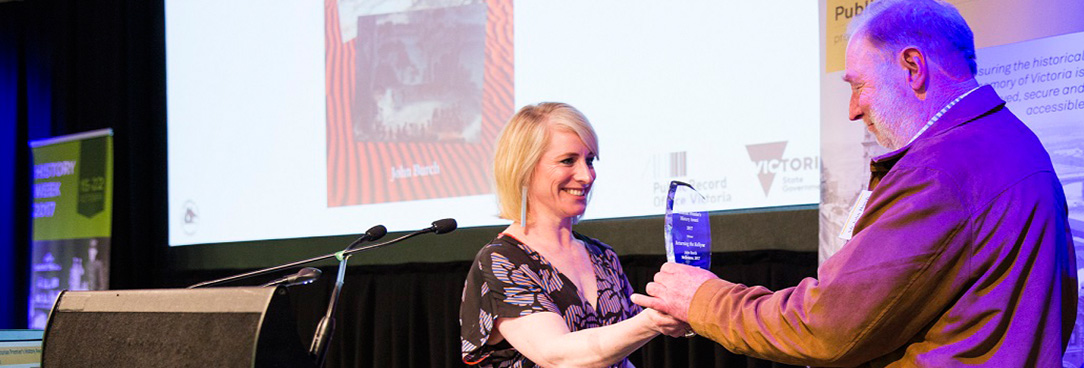
Author: Kate Follington
In 2017 John Burch was awarded the inaugural Victorian Premier’s History Award for his book Returning the Kulkyne in a ceremony at the Arts Centre Melbourne. This is the most prestigious award handed out during the annual Victorian Community History Awards.
Returning the Kulkyne provides an insight into the human stories of the Kulkyne, in the north west of Victoria, ranging from the Indigenous Latji Latji and Nyeri Nyeri clans to squatters and pastoralists, hunters, rangers and even railwaymen and the restitution of the environment after decades of misuse and degradation.
Interestingly John didn't originally plan on writing a book, but after the award his work now sells out in local book stores and has drawn the attention of some science teachers wishing to teach local students about land use.
We wanted to find out a little more about John's journey in writing Returning the Kulkyne.
Q&A with author John Burch
Why did you think Returning the Kulkyne needed to be written?
I initially researched the early settlement of the Kulkyne to inform possible land restoration works. I was specifically interested in understanding whether any of the land had been cleared by Aboriginal people before colonial settlement. I had no intention of writing a book. That process uncovered enough interesting, and previously unknown to me, material that I was drawn into writing what I discovered.
Was there something particularly special you uncovered which made the writing journey worthwhile?
In many ways it was the Aboriginal story of the Kulkyne that moved me the most. I had always thought of myself as an ‘enlightened person’ who fully accepted the colonial culpability for the dispossession and devastation of Aboriginal culture and people. But getting up close to an actual story was a challenging experience. Finding in the Mournpall people an echo of the dignity of Barak and the Coranderrk people was totally unexpected. Three years into writing I learnt a bit about myself, when I found I had been unconsciously accepting the myth of the extinction of the Kulkyne people.
Did the writing of this book change the way you see the place you live?
Writing Returning the Kulkyne taught me two things. Firstly it gave me a new understanding of our colonial relationship with the land – our use and abuse of it. I was surprised when the judges described it as a book ‘about country’, because I hadn’t thought of it in that way, but that’s what it was. Secondly, I learnt that telling stories can change the way the past is understood. On that basis I have headed off to Federation Uni to do a PhD in Aboriginal land use.
Winning the Victorian Premier's History Award, how was that for you?
Shock. Surprise. Dumbfounded. I still feel like an imposter – but I realise a big story, about a new place, from a new perspective is a powerful formula.
What do you think the benefits of participating in the awards program are for community historians?
Community History is a precious commodity. Across Victoria community organisations are rediscovering and preserving our history, often without any outside assistance. The Awards offer these organisations two things – recognition of the importance of what they do and inspiring models of what can be done.
Enter the 2018 Victorian Community History Awards here.
To buy a copy of Returning The Kulkyne you can email John directly returningthekulkyn@iprimus.com.au
Material in the Public Record Office Victoria archival collection contains words and descriptions that reflect attitudes and government policies at different times which may be insensitive and upsetting
Aboriginal and Torres Strait Islander Peoples should be aware the collection and website may contain images, voices and names of deceased persons.
PROV provides advice to researchers wishing to access, publish or re-use records about Aboriginal Peoples
